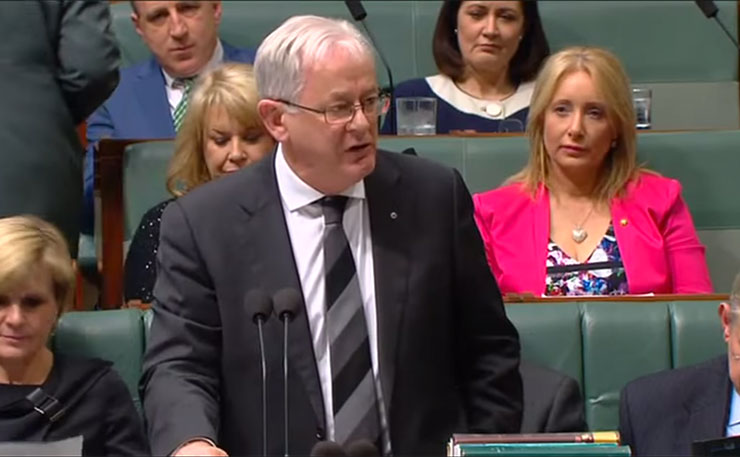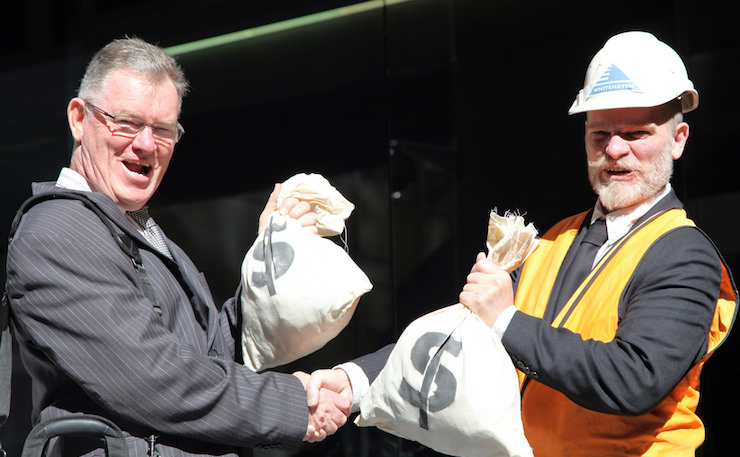Another day, another Liberal Party funding scandal. This is what happens when you leave politicians to regulate themselves, writes Ben Eltham.
According to the Miriam Webster dictionary, parakelia is “a succulent herb (Calandrinia balonensis) that is an important livestock feed in drier parts of interior Australia.”
A succulent snack of a different nature is currently intriguing observers of Australian politics. This juicy treat goes by the name of Parakeelia Ltd, a market research company wholly owned and run by the federal Liberal Party.
In recent days, it has emerged that Parakeelia is a handy little earner for the Liberal Party, routing hundreds of thousands of dollars of taxpayer funding into the federal party coffers.
In the process, Parakeelia has also shone a light on some darker corners of Australian privacy law, which has a little-known special clause protecting political parties.

Parakeelia is a Liberal Party operation. Its director is federal campaign boss Tony Nutt, a veteran Liberal staffer who is also a key player in Malcolm Turnbull’s administration. The firm was first set up by Andrew Robb. Before he entered Parliament, Robb was a factional boss and numbers man in the federal Liberal Party. In the late 1990s, Robb worked for big international database firm Axciom. At various points CEO and Executive Chair of Axciom Australia, Robb’s specialty was direct marketing.
Parakeelia markets a database called Feedback, which allows politicians and political staffers to track interactions with voters and constituents. It matches up names of voters from the electoral roll, allowing politicians to build up highly sensitive profiles of individual voters.
According to a confidential Parakeelia document obtained by the ABC, “Feedback is a confidential online database, which is exempt from privacy laws.” The document states that Feedback can track sensitive personal information such as: “contact details, salutations, mail addresses, voting preferences, national issues, local issues, survey responses, memberships, dead mail, contact history, general tags, occupations, ethnic identity, donations, marital status and modified surname.”
You can see why a political party would be interested in building up a database of this nature. Voters in marginal seats are critical targets. Matching voter identity to key demographic details like voting preference, marital status, and ethnicity allows careful targeting of constituents in an election campaign. Sophisticated databases of this nature have become key tools for major parties looking to win voters over, issue by issue, vote by vote.
In other words, if a major party politician comes knocking on your door, it’s a fair bit they already know plenty about you.
Parakeelia can build up such a sensitive database, cross-matched with the electoral roll, because the Privacy Act allows it. Registered political parties, or contractors for political parties, have their own special exemption under privacy law.
Both major parties have been building their voter databases for more than a decade. Parakeelia was reported on by David Marr in the Sydney Morning Herald back in 2007. Even then, the privacy implications were obvious. “Concern has been expressed in the press and academic circles that Feedback and Electrac, the equivalent software used by the Labor Party, might be violating the privacy of constituents,” Marr wrote.
The growth of Feedback and Electrac show just how closely the major parties surveil ordinary citizens in order to harvest their vote. As political scientists Philip N. Howard and Daniel Kreiss wrote in a 2010 paper on voter privacy, “journalists — and citizens — rarely realise that data about them is being collected and used for political purposes.”
Parakeelia also comes with an added insult to taxpayers, in the form of a perfectly legal donations scam that benefits the Liberal Party.
Liberal Party parliamentarians pay Parakeelia an annual subscription of $2,500 for use of the Feedback database. The fee is not paid by the party, but by the taxpayer, because it comes out of each member’s parliamentary allowance.
In return, Parakeelia donates hundreds of thousands of dollars back to the Liberal Party, effectively ensuring the party benefits from the public purse in return for accessing intimate details of ordinary citizens’ lives. The firm has donated around $1 million to the Liberal Party in the past three years. On one measure Parakeelia is now the second-largest donor to the federal Liberal Party (that we know of).
Opposition Leader Bill Shorten pointed out yesterday that this amounted to money laundering. “This looks like a Liberal Party washing machine turning taxpayer dollars into Liberal party profits,” Shorten told journalists. Labor wants the scam looked into by the Auditor-General.
In response, Tony Nutt has released a media statement in which he said Parakeelia is “run on a professional basis, independently audited and complies with the law.”
“The provision of electoral roll systems and data management by the Party complies fully with the statutory obligations imposed by the Commonwealth Electoral Act on the use of such data including the prohibition on commercialization,” Nutt continued. “The provision for Members and Senators to use what is now their communications allowance for this purpose is long established and set out in the relevant provisions in the Parliamentary Entitlements Act.”
Of course, this completely misses the point. Parakeelia probably does comply with the law. That just shows how loose the law is. The law specifically allows the major parties to get away with this.
The donations laundering at Parakeelia shows yet again how lax Australia’s political donations regulations are. As we know from the investigations of the New South Wales Independent Commission Against Corruption, the federal Liberal Party has long used a series of “associated entities” through which donations to federal and state branches of the party can be routed. The most notorious of these “sham charities” is the so-called Free Enterprise Foundation. We can now add Parakeelia to the list.
But the privacy abuses of the major parties should be just as concerning. Feedback and Electrac hold huge troves of sensitive data about nearly every adult Australian. Should they be hacked and that information disclosed, the data spill would pose grave risks to citizens from cyber criminals and scammers.
Of course, the biggest scammers of all are the politicians themselves. As the Privacy Act exemption shows, political parties are only too happy to rig the system in their favour.
Australia is the only western democracy in which parties are permitted to access data from the electoral rolls for partisan political purposes. If further evidence for a federal anti-corruption watchdog is needed, surely this is it. Parakeelia shows that those write the rules will always be tempted to rig the rulebook in their own favour.
Donate To New Matilda
New Matilda is a small, independent media outlet. We survive through reader contributions, and never losing a lawsuit. If you got something from this article, giving something back helps us to continue speaking truth to power. Every little bit counts.





